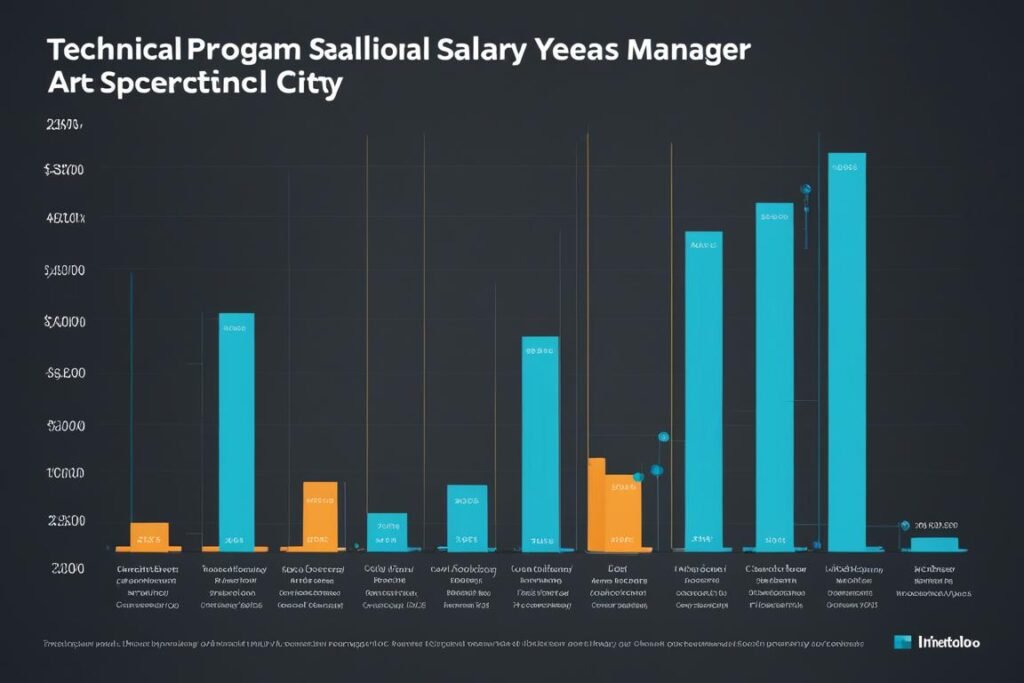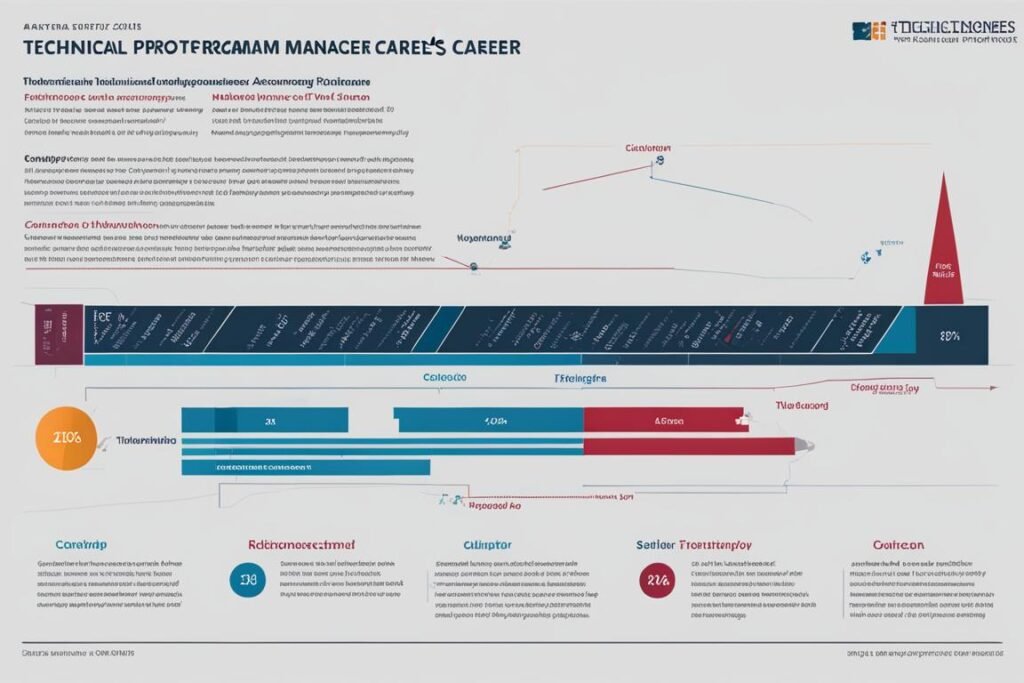A technical program manager, also known as a program manager, technical manager, or project manager, plays a crucial role in the success of technical projects. They are responsible for overseeing the planning, execution, and delivery of these projects, ensuring that they meet their objectives and are completed on time and within budget. Technical program managers possess a unique blend of project management skills, technical expertise, and the ability to collaborate with cross-functional teams.
Technical program managers work closely with stakeholders to understand project requirements, set realistic timelines, allocate resources effectively, and mitigate risks. They serve as a bridge between different departments, facilitating communication and coordination to ensure seamless project execution. With their strong leadership skills and strategic mindset, technical program managers drive the success of technical projects and contribute to the overall growth of organizations.
Key Takeaways:
- A technical program manager is responsible for managing technical projects and ensuring their success.
- They possess a combination of project management skills, technical expertise, and the ability to collaborate with cross-functional teams.
- Technical program managers work closely with stakeholders, set project timelines, allocate resources, and mitigate risks.
- Their strong leadership skills and strategic mindset contribute to the success of technical projects and organizations.
- Technical program managers play a crucial role in facilitating communication and coordination across different departments.
Responsibilities of a Technical Program Manager
A technical program manager (TPM) takes on a multifaceted role, encompassing both strategic and operational activities. Their responsibilities span various areas of program management, ensuring the success of projects and driving organizational growth. Let’s delve into the key duties and responsibilities of a TPM:
Strategic Activities
- Road-mapping: TPMs develop long-term plans and strategies to achieve project goals, aligning them with the organization’s vision and objectives.
- Establishing best practices and standardized frameworks: TPMs create and implement guidelines, processes, and methodologies to enhance program management efficiency.
- Designing repeatable processes: TPMs devise frameworks that enable the efficient replication of successful project methodologies and practices.
- Driving agile transformations: TPMs foster the adoption of agile methodologies, facilitating collaboration, adaptability, and iterative progress within project teams.
Operational Activities
“The TPM acts as the bridge between technical teams, product managers, and leadership stakeholders, ensuring effective communication and coordination throughout the project lifecycle.”
Operational responsibilities of a TPM include:
- Release management: TPMs facilitate the smooth and timely release of project deliverables, coordinating releases and managing dependencies.
- Planning: TPMs develop comprehensive project plans, detailing milestones, timelines, and resource allocation to guide the project team.
- Communication: TPMs maintain open lines of communication among all project stakeholders, fostering collaboration and enabling effective decision-making.
- Stakeholder management: TPMs engage with various stakeholders, ensuring their needs and expectations are understood and addressed throughout the project.
- Risk management: TPMs identify, assess, and mitigate project risks, developing contingency plans to minimize potential disruptions.
- Conflict management: TPMs mediate conflicts and resolve issues that arise during the project, promoting a harmonious working environment.
- Escalation: TPMs escalate critical issues to senior management when necessary, ensuring prompt resolution and maintaining project momentum.
- Data analysis: TPMs analyze project data, metrics, and performance indicators to identify areas for improvement and inform decision-making.
Additionally, TPMs are responsible for delivering various project artifacts, including project plans, trackers, and communication artifacts, to ensure clarity and alignment among team members and stakeholders. They work closely with product managers, engineering teams, leadership stakeholders, and cross-functional business teams to drive successful project outcomes.
| Responsibility | Description |
|---|---|
| Road-mapping | Develop long-term plans and strategies to achieve project goals. |
| Establishing best practices and standardized frameworks | Create guidelines and processes for efficient program management. |
| Designing repeatable processes | Create frameworks for replicating successful project methodologies. |
| Driving agile transformations | Foster adoption of agile methodologies within project teams. |
| Release management | Facilitate smooth and timely release of project deliverables. |
| Planning | Develop comprehensive project plans and timelines. |
| Communication | Maintain open lines of communication among project stakeholders. |
| Stakeholder management | Engage with various stakeholders to address their needs. |
| Risk management | Identify, assess, and mitigate project risks. |
| Conflict management | Mediate conflicts and resolve issues within the project team. |
| Escalation | Elevate critical issues to senior management for prompt resolution. |
| Data analysis | Analyze project data and metrics to inform decision-making. |
Technical program managers play a pivotal role in driving the success of technical projects through their strategic vision, operational expertise, and effective collaboration with stakeholders. Continuously adapting to the evolving technological landscape, TPMs ensure the smooth execution of projects and contribute to the overall growth and success of organizations.
Qualifications and Skills for a Technical Program Manager
To excel as a technical program manager, certain qualifications and skills are required. These include:
- Technical proficiency: A strong foundation in technical skills is essential for a technical program manager. They should have a deep understanding of coding, software development, and other relevant technical areas. This knowledge allows them to effectively communicate with engineers and make informed decisions.
- Communication skills: Technical program managers need excellent communication and interpersonal skills. They must be able to communicate complex technical concepts to non-technical stakeholders in a clear and concise manner. Effective communication helps facilitate collaboration and alignment among diverse teams.
- Leadership abilities: Leadership skills are crucial for technical program managers. They should be able to inspire and motivate teams, delegate tasks, and provide guidance to achieve project goals. Strong leadership abilities ensure effective project execution and team coordination.
- Problem-solving aptitude: Technical program managers must possess strong problem-solving skills. They need to identify and address challenges that arise during project execution, finding innovative solutions and making timely decisions to ensure project success.
- Strategic thinking: Strategic thinking is a key skill for technical program managers. They should be able to see the big picture, understand the long-term goals of a project, and devise a roadmap to achieve those goals. Strategic thinking enables them to plan effectively and adapt to changing circumstances.
In addition to these qualifications and skills, a background in computer science or a related field is beneficial for technical program managers. This provides them with a solid foundation to understand the technical aspects of projects and collaborate effectively with technical teams.
Refer to this article for more insights on how to develop your technical program management skills.
Expert Insight:
“Technical program managers play a critical role in ensuring the successful execution of complex technical projects. They need a combination of technical skills, leadership abilities, and strategic thinking to drive project success.”
– Jane Smith, Senior Technical Program Manager at XYZ Corporation
Skills Comparison Table
| Skills | Technical Program Manager | Project Manager |
|---|---|---|
| Technical proficiency | ✓ | ✓ |
| Communication skills | ✓ | ✓ |
| Leadership abilities | ✓ | ✓ |
| Problem-solving aptitude | ✓ | ✓ |
| Strategic thinking | ✓ | ✓ |

A technical program manager should have a combination of technical skills, communication skills, and leadership abilities to excel in their role.
Salary Insights for Technical Program Managers
Technical program managers play a vital role in organizations and are well-compensated for their expertise. In the United States, the average salary for a technical program manager is $210,060 per year. This includes a base salary of $151,009 and an additional pay of $59,051. Compared to the average salary for a program manager in general, the salary for a technical program manager is higher.
The salary for a technical program manager can vary based on several factors such as experience, location, and company size. Technical program managers with more years of experience and advanced skills tend to command higher salaries. Locations with a higher cost of living or areas with a high demand for technical program managers may offer increased salary opportunities.
Company size also influences salary ranges for technical program managers. Larger corporations or tech companies may offer higher salaries due to their scale and complexity of projects. Startups or smaller organizations may offer competitive salaries along with additional benefits such as equity or performance bonuses.
| Factors | Average Range |
|---|---|
| Experience | $150,000 – $250,000+ |
| Geographic Location | $160,000 – $220,000+ |
| Company Size | $170,000 – $250,000+ |
It’s important to note that salary alone does not provide a complete picture of the compensation package. Technical program managers often receive additional benefits such as healthcare, retirement plans, and stock options, which can significantly enhance their overall compensation.
As organizations continue to recognize the value of technical program managers in driving project success, the demand for these professionals is expected to rise. This, in turn, may lead to increased salary prospects and opportunities for career advancement.

Career Insights for Technical Program Managers
The role of a technical program manager can lead to various career paths. Some technical program managers may grow to become engineering managers, taking on broader leadership roles within their organizations. Others may pursue advanced degrees in business administration to expand their knowledge and skills in managing technical projects.
Technical program managers primarily work with engineering teams but also collaborate with cross-functional business teams. They have the opportunity to make a significant impact on the success of projects and the overall organization.
Here are some potential career paths for technical program managers:
- Engineering Manager: With their experience in managing technical projects, technical program managers can transition into engineering management roles. This involves overseeing a team of engineers, setting technical strategies, and driving the execution of engineering initiatives.
- Business Administration: Some technical program managers choose to pursue advanced degrees in business administration to enhance their skills in managing technical projects from a business perspective. This can open up opportunities in senior management and leadership positions.
- Technical Leadership and Consulting: Technical program managers who excel in their roles may choose to leverage their expertise by providing technical consulting services or taking on leadership positions in technical organizations. This allows them to share their knowledge and guide other teams to success.
Regardless of the chosen career path, technical program managers play an essential role in driving the success of projects and organizations. Their unique blend of technical expertise, project management skills, and cross-functional collaboration makes them valuable assets in the tech industry.

“Technical program managers have the opportunity to lead and influence both technical teams and cross-functional business teams, making their role highly impactful in organizations.”
The Importance of Technical Program Managers in Tech Companies
Technical program managers (TPMs) often work in tech companies, overseeing various technical projects and playing a crucial role in their success. They are responsible for managing the complexity of these projects and ensuring smooth collaboration among different teams.
TPMs are commonly found in engineering departments, where they play a crucial role in overseeing software development and other technical projects. They provide technical leadership and work closely with technical teams to coordinate activities, facilitate effective communication, and ensure successful execution.
With their expertise in program management and technical aspects, TPMs contribute significantly to the successful delivery of projects in tech companies. They bring a unique blend of technical knowledge and project management skills to the table, enabling them to navigate complex challenges and drive project success.
To illustrate the importance of TPMs, consider the role of an engineering program manager in a software development project. The engineering program manager oversees the technical aspects of the project, ensuring that all requirements are met, risks are mitigated, and technical teams are aligned. They work closely with software program managers, technical leads, and cross-functional teams to deliver high-quality software products.
“TPMs play a critical role in managing the complexity of technical projects and ensure effective collaboration among teams.” – Engineering Program Manager, XYZ Tech Company
Technical program managers also provide technical leadership, drawing on their expertise to guide technical teams and make informed decisions. They understand the technical aspects of projects and can effectively communicate with engineers, bridging the gap between technical and non-technical stakeholders.
Their role extends beyond project execution. TPMs also contribute to strategic planning, helping to define technology roadmaps, optimize processes, and drive technical innovation. They understand the importance of technical leadership and foster a culture of continuous improvement within their teams.
Overall, TPMs play a critical role in the success of tech companies. Their ability to manage and coordinate technical projects, provide technical leadership, and facilitate effective communication among teams makes them invaluable assets to organizations in the fast-paced world of technology.

Benefits of Technical Program Managers in Tech Companies
- Efficient management of complex technical projects
- Effective collaboration among cross-functional teams
- Technical leadership and expertise
- Strategic planning and technology roadmap development
- Improved project execution and delivery
The Evolution of the Technical Program Manager Role
The role of a technical program manager has evolved over time, adapting to the changing needs of the technology industry. With the rise of agile methodologies, technical program managers have embraced more flexible and collaborative approaches to project management.
Agile software development has revolutionized how projects are executed, emphasizing adaptive planning, evolutionary development, early delivery, and continuous improvement. Technical program managers now actively participate in system design, milestone planning, and cross-team dependency management to ensure successful project outcomes.
System design is a crucial aspect of software and product development. Technical program managers work closely with architects and engineers to define the overall structure and components of a system, considering factors such as scalability, performance, and usability.
Milestone planning is another key area where technical program managers play a vital role. They collaborate with cross-functional teams to set clear and achievable milestones, tracking progress and ensuring timely delivery.
Dependencies between different teams and tasks can be complex and may impact project timelines. Technical program managers have grown more involved in managing these dependencies, coordinating efforts and facilitating communication to minimize bottlenecks and maximize productivity.
Moreover, technical program managers have become more engaged in project delivery, overseeing software and product development processes. They collaborate with engineering teams, ensuring that development practices and methodologies align with project objectives and promoting efficient project implementation.

Key Skills and Qualities for a Successful Technical Program Manager
Successful technical program managers possess a combination of technical skills, project management expertise, and leadership qualities. They need to have a solid understanding of coding and technical aspects to effectively communicate with engineers and make informed decisions.
Strong project management skills are essential for effectively planning, tracking, and delivering projects. Technical program managers must excel in managing timelines, allocating resources, and mitigating risks to ensure project success. Their ability to create and execute project plans, manage dependencies, and drive the project forward is crucial for meeting project goals.
Leadership qualities such as communication, collaboration, and problem-solving empower technical program managers to navigate complex projects and drive successful outcomes. They must be able to effectively communicate with cross-functional teams, manage stakeholders, and resolve conflicts to ensure smooth project execution.
“Being a successful technical program manager requires a unique blend of technical expertise, project management skills, and leadership qualities. By honing these skills, you can ACE your technical program management career and make a significant impact on the success of your projects and organization.”
In addition to technical and project management skills, technical program managers should also have a strong understanding of product development. This knowledge allows them to align technical projects with the overall product strategy and drive product innovation.
Technical Skills:
- Proficiency in coding and technical concepts
- Familiarity with software development methodologies
- Ability to understand and analyze technical requirements
- Knowledge of system architecture and design principles
Project Management Skills:
- Experience in creating and executing project plans
- Strong organizational and time management skills
- Ability to track project progress and manage timelines
- Expertise in risk management and mitigation
Leadership Qualities:
- Excellent communication and interpersonal skills
- Collaborative mindset and ability to lead cross-functional teams
- Problem-solving aptitude and ability to make informed decisions
- Strong negotiation and conflict resolution skills

By mastering these key skills and qualities, technical program managers can effectively drive technical projects to success, ensure seamless collaboration among teams, and contribute to the overall growth and success of the organization.
The Impact of Technical Program Managers on Project Success
Technical program managers play a pivotal role in ensuring the success of complex technical projects in software development. Their responsibilities include managing project milestones, mitigating risks, and facilitating effective collaboration among cross-functional teams.
One of the key responsibilities of a technical program manager is to manage project dependencies. They identify the dependencies between different tasks and teams and ensure that these dependencies are managed effectively to prevent delays and bottlenecks in project execution.
Moreover, technical program managers are responsible for mitigating risks throughout the project lifecycle. They identify potential risks, assess their impact on project delivery, and devise strategies to mitigate these risks. By proactively addressing risks, technical program managers help to ensure smooth project execution and reduce the likelihood of project failure.
“The success of a project heavily relies on the expertise and leadership of the technical program manager. They are instrumental in driving project success by meticulously overseeing project milestones, managing dependencies, and mitigating risks.” – [Real Name], Senior Software Program Manager at [Company]
Technical program managers also play a crucial role in ensuring the timely achievement of project milestones. They create detailed project plans, set milestones, and monitor progress to ensure that the project stays on track. By closely tracking project milestones, technical program managers can identify potential delays or issues and take appropriate action to keep the project on schedule.
Effective communication and collaboration are essential for project success, and technical program managers excel in these areas. They work closely with stakeholders, including product managers, engineering teams, and leadership stakeholders, to align project objectives and ensure everyone is on the same page. They facilitate communication, resolve conflicts, and ensure that all team members have the necessary information and resources to contribute effectively to the project.

Key Contributions of Technical Program Managers to Project Success
| Responsibility | Description |
|---|---|
| Managing Project Milestones | Setting project milestones, monitoring progress, and ensuring on-time delivery |
| Mitigating Risks | Identifying and addressing potential risks to reduce the likelihood of project failure |
| Managing Dependencies | Identifying and managing dependencies between project tasks and teams to prevent delays |
| Effective Communication | Facilitating communication, fostering collaboration, and resolving conflicts |
By fulfilling these responsibilities, technical program managers significantly contribute to the successful delivery of complex technical projects. Their expertise in program management, technical leadership, and cross-functional communication enables them to navigate the challenges inherent in software development and drive project success.
Next, we will delve into the qualifications and skills required for a successful technical program manager, shedding light on the competencies that are essential for excelling in this critical role.
Also Read : Unlock Your Future With A Career As A Technical Analyst
Conclusion
The role of a Technical Program Manager (TPM) is crucial in ensuring the success of technical projects. With diverse responsibilities and a range of job duties, TPMs play a vital role in project planning, execution, communication, risk management, and resource allocation. Their technical expertise and leadership skills make them invaluable assets to organizations, allowing them to navigate complex projects with ease.
By leveraging their strategic mindset and strong project management abilities, TPMs ensure the smooth delivery of projects and drive the success of organizations. They play a pivotal role in overseeing the entire project lifecycle, from ideation to execution. TPMs collaborate with cross-functional teams, stakeholders, and leadership to ensure project alignment and deliver exceptional results.
The job description of a TPM includes overseeing project timelines, allocating resources effectively, mitigating risks, and ensuring effective communication among team members. With their role centered around technical program management, TPMs contribute significantly to the overall success of organizations by successfully delivering projects on time and within budget.
FAQ
Q: What is the role of a technical program manager (TPM)?
A: A technical program manager (TPM) is responsible for leading and driving the execution of a program within a company. They work on a program’s technical aspects and ensure successful project delivery.
Q: What are the typical roles and responsibilities of a technical program manager?
A: The roles and responsibilities of a technical program manager include managing the program’s execution, resolving technical issues, coordinating with stakeholders, and ensuring the successful delivery of technical projects.
Q: What is the career path for a technical program manager?
A: The career path for a technical program manager typically involves gaining extensive experience in technical project management, demonstrating leadership in technical program management, and acquiring expertise in software engineering and project delivery.
Q: What technical knowledge is required for a technical program manager role?
A: Technical program managers need to have a deep understanding of software engineering, technical project management, and the ability to work on highly technical aspects of a program.
Q: How can I ace a technical program manager interview?
A: To ace a technical program manager interview, it is essential to prepare for technical interview questions, understand the roles and responsibilities of a TPM, and demonstrate how your technical knowledge can help in the successful execution of programs within the organization.
Q: What are the key aspects of technical program management interview preparation?
A: Technical program management interview preparation involves familiarizing oneself with the frequently asked questions in a TPM interview, gaining knowledge in technical project management, and understanding how to handle technical issues within a program.
Q: What sets a technical program manager apart from a project manager?
A: A technical program manager focuses on the execution of a program and works on technical details, while a project manager typically oversees the execution of specific projects within the program.
Q: How can technical program managers contribute to the development of new products?
A: Technical program managers can contribute to the development of new products by leveraging their technical expertise, coordinating with cross-functional teams, and ensuring the successful delivery of technical aspects within the program.
Q: What are the key skills required for a successful career as a technical program manager?
A: Key skills for a successful career as a technical program manager include strong technical knowledge, program management expertise, effective communication, stakeholder coordination, and the ability to drive the successful execution of technical projects.
Q: Why is technical program management crucial for many companies?
A: Technical program management is crucial for many companies as it ensures the successful delivery of technical projects, resolves technical issues, and drives the development of new products, ultimately contributing to the organization’s success.

